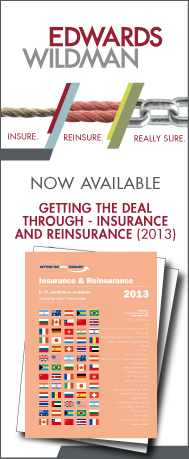 |
|
| edwardswildman.com | |
Claims Control Clauses: No Self-Control? by Mark Everiss ,
Sam Tacey The High Court rules on the effect of a claims control clause where cedants and some reinsurers unilaterally paid out their share of a claim. The High Court case of Beazley Underwriting Limited & Ors v Al Ahleia Insurance Company & Ors [2013] EWHC 677 (Comm) considered the applicability of a claims control clause where one reinsurer and the cedants had unilaterally agreed to pay their share of a claim, while others disputed it. The court found that, on the facts, there had been no breach of a claims control clause (CCC) so the other reinsurers could not rely on it to deny liability under the contract. The Facts The case involved a dispute between reinsurers (the Claimants) and cedants (the Defendants) concerning a claim for repair or rebuilding of a faulty crude oil storage facility in Kuwait. On discovery of the damage to the tank, the insured, the Kuwait Oil Company (KOC), made a claim on its insurance. This was an open cover construction all risks and third party liability policy underwritten by Al Ahleia Insurance Company (AIC) and others. As lead underwriter, AIC held 35% of the risk and handled the claim on behalf of the other insurers. Apart from a 10.5% retention, the risk was reinsured by the Claimants and AIG (not party to this litigation). The Reinsurance Contract, a Lloyd's slip policy, contained a CCC. This made it a condition precedent to liability that: The reinsurers initially denied liability on the grounds that they believed the damage may have been caused by a defect in design. This would have brought the claim within an exclusion in the policy (the LEG2 exclusion) and vastly reduced it in quantum. The reinsurers appointed a loss adjuster and an engineering consultant who concluded that there was indeed a fault in the design of the tank. However, on the application of considerable commercial pressure, AIC and AIG (one of the lead reinsurers) appointed a new loss adjuster. Despite the fact that the new adjuster assessed the loss at a much higher value, and made no mention of the LEG2 exclusion, AIG agreed to pay their 20% reinsured share. The other reinsurers were not involved in these discussions, and Beazley (the other lead reinsurer) only learned of them when the broker emailed them after the agreement had been reached. Further discussions took place between AIC and KOC, with AIC agreeing to pay their retained share and to pay the shares of the reinsurers when they received them. It was these discussions and related correspondence which the Claimants alleged were in breach of the CCC. The Decision Following Lord Justice Longmore’s judgment in Royal & Sun Alliance v Dornoch [2005] Lloyd’s Rep IR 544, Mr Justice Eder held that a CCC will operate as an exemption clause, so the party seeking to rely on that exemption may only do so if the words are clear on its fair construction. Any ambiguity, therefore, was to be construed against the party seeking to rely on the clause (in this case, the Claimants). The judgment addressed subparagraphs (b) and (c) of the CCC in turn. In respect of subparagraph (b), Eder J held that on the facts, the discussions were not negotiations but merely KOC putting its demands to AIC. He also found that internal emails within AIC approving payment amounts and various items of correspondence between AIC and KOC were not negotiations, so were not in breach of the CCC. Once the other reinsurers had been informed, any further discussions were not in breach of the CCC as they had had the opportunity to take part in any negotiations after that date. The remainder of the case concerned whether the Defendants were in breach of subparagraph (c) of the CCC, namely whether any settlement, compromise or admission of liability had taken place. Eder J held that the subparagraph in question should not be read in isolation, but in the context of the whole CCC and according to business common sense. He said that “in the absence of very clear words to the contrary, the defendants should, if they so wish, be entitled to settle, compromise or admit liability under the Insurance Policy at least if such settlement, compromise or admission is not in respect of or in connection with any loss or losses that might give rise to a claim under the Reinsurance Contract/Declaration”. He therefore concluded that subparagraph (c) did not apply to “any settlement, compromise or admission of liability in respect of AIG’s share or the defendants’ own retention”, but was confined to settlement of losses that might give rise to a claim under the reinsurance contract. However, while this in itself was determinative of the issue, Eder J had also been presented with arguments concerning the meaning of the words ‘settlement’ and “admission of liability”. During the course of his judgment, he observed that ‘settlement’ implied “a legally binding agreement… or the actual transfer of consideration of some kind”, including ex gratia payments. Further, he said that admission of liability must be “communicated in clear and unequivocal terms by one party to the other”, even if it was only in respect of part of the claim. However, he did not consider that this included offers to pay money. On the facts, therefore, he did not believe that there had been any settlement, compromise or admission of liability either in respect of AIG’s share or the Defendants’ retained share. Conclusion In many respects, as is often the case, this case and the decision which was reached turned to a great extent on the particular facts before the court. However, the decision did establish that, where a reinsurance policy contains a CCC with the same wording as that used by the parties in this reinsurance declaration, cedants will be free to settle their own retained part of the claim providing they do not admit liability for or settle any part of the claim that might give rise to a claim under the reinsurance contract. Similarly, cedants will not find themselves in breach of this type of CCC if a reinsurer settles its share unilaterally. The case demonstrates that a CCC should be very carefully drafted, as the slightest ambiguity may be construed against the party seeking to rely on it. Further, reinsureds should take care in their actions in claims adjustment and negotiation, particularly when the CCC is a condition precedent. Contact
| |
 |
|



